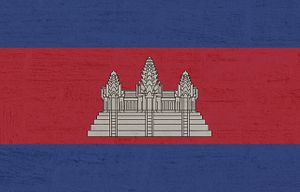A batch of new political parties are emerging in Cambodia, determined to end the country’s status as a one-party state with a direct challenge to Prime Minister Hun Sen and his Cambodian People’s Party (CPP) at elections due over the next two years.
Among them are the Cambodia Reform Party (CRP), the Khmer Conservative Party (KCP) and the Khmer National Love Party (KNLP), while former prime minister, Prince Norodom Ranariddh, has also announced his return to the political arena.
Ranariddh, who took three years to recover from a car accident which kept him out of the 2018 election, will lead an attempt to rejuvenate the royalist Funcinpec Party which was once a major force in domestic politics but has failed to win a seat at elections since 2008.
“His health is much better, he walks on his own, has said a lot,” Funcinpec spokesman Phan Sithy said. “We strongly hope that Funcinpec will get seats in the next election.”
The CPP won all 125 seats in the National Assembly at the 2018 poll after the courts dissolved the Cambodia National Rescue Party (CNRP) amid allegations its leaders were fomenting a “color revolution” designed to oust Hun Sen.
Twenty parties contested the poll but human rights groups claimed 16 of them were CPP proxies, while the remaining three opposition outfits – the Khmer Will Party, League for Democracy Party, and Grassroots Democracy Party – failed to make an impact.
However, competition from the KRP and the KLP could enliven the commune elections to be held next year and at general elections due in July 2023.
The parties’ members and supporters include defectors and “rehabilitated” CNRP activists who also raised the prospect of a coalition to tackle the CPP, a party which has been in power in various guises since the overthrow of the murderous Khmer Rouge regime in 1979.
Ever since, the CPP has been accused of bullying and intimidating voters. CNRP leader-in-exile Sam Rainsy has also made unsubstantiated allegations of widespread rigging and has threatened to return and stage a popular uprising and oust Hun Sen.
The initial threat, in late 2019, failed and since then hundreds of CNRP supporters in Cambodia, including its leader Kem Sokha, have been rounded up and are currently before the courts in a mass trial of treason and incitement charges. Many have been banned from politics for five years.
The problem for all opposition outfits is the ruling party’s machinery, its formidable reach across Cambodia and its popularity in the countryside, particularly among older voters who credit Hun Sen and the CPP with ending a 30-year period of war and revolution that reduced Cambodia to a failed state.
Seats are heavily loaded in favor of rural voters at the expense of the cities, where the electorate has traditionally favored the opposition.
To help counter this a coalition of the minor parties has been floated with the Khmer Will Party (KWP), the CNLP, and the CRP, which is still seeking registration, the most likely candidates.
But those taking part have been rebuked by Sam Rainsy as an “artificial opposition” and that prompted a retort from Ou Chanrath of the CRP, who accused his former leader of “smearing” the new parties.
Kem Sokha, whose high popularity is always a dreadful headache for the CPP, has told former CNRP politicians not to use his name or evoke his image while campaigning. That was also due to legal reasons while his trial continues.
Meanwhile, Funcinpec still has to earn the trust of wary voters. The party’s fall from grace followed years of corruption, particularly after Ranariddh sold the building that was once his party’s headquarters for $3.6 million on 2005 and was accused of pocketing the money.
The political realities are stark. The dissolution of the CNRP has splintered the opposition and there are no capable leaders with a matching public profile capable of challenging Hun Sen.
Those who can are either in jail or living in exile which says much about the state of Cambodia’s democracy. Success in 2023 will be measured by the few seats they might win.
Luke Hunt can be followed on Twitter @lukeanthonyhunt

































